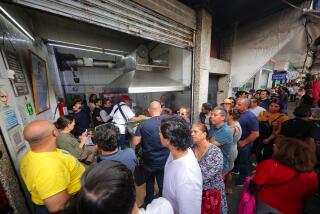Mexican Franchise Effort Is Having Its Growing Pains : Commerce: Some entrepreneurs failed after deviating from proven formulas. Voluntary guidelines are being devised to help remove stumbling blocks.
- Share via
MEXICO CITY — McDonald’s makes it look easy.
Customers step through the doorway below the golden arches, and they are in Ronald McDonaldland, where a dozen cash registers simultaneously ring up hamburgers, french fries and milk shakes--just like at any other McDonald’s.
But a little over a year into Mexico’s franchise boom, businesses here are learning that it is not as easy as it looks. While some are thriving, others are floundering badly, unable to re-create in Mexico the cookie-cutter uniformity that U.S. customers have grown to expect.
Liberalization of Mexico’s franchise rules has brought a flood of new registrations--46 U.S. franchises in 1990, more in one year than the combined total through 1988.
The franchise boom is part of Mexico’s overall effort to deregulate and modernize its economy. Franchises quickly generate investment and jobs and bring up-to-date operating methods into Mexico’s service economy. The intent is that Mexican entrepreneurs and workers will learn from the American firms and then spread their knowledge to other sectors of the economy.
“We are not going to rely on franchising as the only way to develop the country but it does fill important niches,” said Jose Antonio Toledo, who as director of technology transfer at the Commerce Ministry is the official most directly involved with franchising.
Mexico is feeling the pressure to move rapidly, with negotiations for a North American free trade agreement approaching. U.S.-Mexico trade has more than doubled over the past decade, reaching $58 billion last year, and is expected to escalate rapidly if a free trade agreement takes effect. Mexicans want to get their share of that growing commerce and they believe franchises offer a way to do just that.
Franchising’s boost to Mexico’s service sector would help make the entire economy more competitive, economists say. And, as Mexican entrepreneurs become accustomed to franchising, they can use the concept to expand their own businesses into the United States and Canada, repeating the success of El Pollo Loco, the Mazatlan restaurant that licensed its roast chicken secrets and started a craze north of the border.
Moreover, the Mexican government’s newly found acceptance of franchises has created an opportunity for U.S. companies that before had felt shut out of the Mexican market. A few companies, such as Kentucky Fried Chicken, have operated in Mexico for more than a decade. But they were the exception. Government scrutiny and piles of red tape assured that only the most committed franchisers got into Mexico. That system was junked as President Carlos Salinas de Gortari’s administration embarked on a program of deregulation.
“We decided that Mexican entrepreneurs are not stupid,” said Roberto Villarreal, general manager of technology development at the Commerce Ministry. “They do not need the paternalistic meddling of the government.”
The new regulations eliminated government-fixed maximums on royalties, permitted protection of know-how, allowed strict product standards and streamlined administrative procedures. The difference in procedures meant that while franchise registration took McDonald’s two years in the late 1980s, today’s franchisers are guaranteed their registrations will be completed in 45 days.
While fast food and hotels dominated the first year’s registrations under the new regulations, the types of franchises are becoming more diversified as companies from real estate and business services to weight control clinics register with the government.
However, the boom has brought problems as well.
One of the big stumbling blocks, said Michael G. Brennan, a partner with Chicago-based Rudnick & Wolfe, the International Franchise Assn.’s law firm, is that smaller U.S. companies often do not realize the commitment they are undertaking when they sell foreign franchises.
“The tendency is to accept a big, upfront fee and put it in their pocket,” he said. Instead, the money should be used to provide services and support for foreign affiliates, he said.
Enrique Gonzalez, a Mexican attorney and the IFA representative here, said Mexican franchisees are often equally to blame. “Some people treat buying a franchise like buying the rights to use a trade name,” he said. “It isn’t.”
The value of a franchise, he said, is in the method of doing business, far more than in the name. Some operators fail because they want to run the shop their way instead of following the proven formula of the parent company.
Other problems involve importation and distribution of distinctive products that must be replenished from the United States.
“Getting things over the border can be a problem,” said Donald Fertman, director of franchise sales at Milford, Conn.-based Subway, known for its french-roll style buns. Despite well-publicized Mexican efforts to speed up import procedures, goods still get delayed at the border so the local shop runs out of certain items.
That can result in disappointments for longtime Subway fans such as Warren Kaufman.
Kaufman, a Texas attorney working for a Mexican law firm, was among the first eager customers when Subway opened its Mexico franchise a year ago. During a recent lunch at the Subway in Mexico’s Zona Rosa shopping district, he was less enthusiastic.
“We’re out of turkey breast today,” the counterman said nonchalantly--no explanation, no apology, no turkey. Kaufman, the lone customer at the counter, asked, “What else are you out of today?”
“They are always out of something, usually two or three things,” he explained. Then, the cookies he bought were stale.
But Kaufman still eats at Subway about once a week because it is near his office and the turkey and the tuna are good--when they have them.
Other potential customers are less forgiving. On a recent weekday afternoon, barely two dozen diners passed through the Subway counter at lunchtime.
Despite such difficulties, Subway’s Fertman said, “we have been happy with the results” of the Mexico franchises.
In Mexico, few people with the $50,000 or more needed to open a franchise will stand behind the counter. So, in a sharp departure from established U.S. franchising practice, Mexican outlets tend to be backed by investors, who hire workers to mind the store.
For example, the Monterrey-based business machine distributor, Multi-Lito, is the investor behind the Mexican franchise operation for Sir Speedy, the U.S. business services company.
“We decided on a franchise with established business systems because that would allow us to open 15 stores the first year and 50 in five years,” said Ricardo Kane Quiros, vice president of operations at Multi-Lito.
U.S. companies are adjusting to Mexico’s franchising environment in a variety of ways. For example, San Diego-based Mail Boxes, Etc., a postal service company, relied on U.S. retirees to run franchises in Tijuana, Rosarito and Mexicali.
But now that the company is moving into central Mexico, it will try a different strategy. The U.S. company will insist that franchisees open only one store at a time. After one store is operating successfully, the affiliate will be allowed to start additional stores.
In a different approach, Alfagraphics, which does copying and other business services, is trying to establish a financing program that will allow its operators to borrow money for fees and equipment from the small-business fund of Mexico’s national development bank, Nacional Financiera.
“We find that having operators on salary does not work out,” said Alejandro Quiroz, president of Alfagraphics de Mexico, the parent company’s master franchisee in Mexico.
Such master franchisees are providing the cultural bridge for smaller U.S. companies entering the Mexican market. They buy the rights for Mexico from the U.S. company and sell the rights to run individual stores in the country.
Master franchisees form the membership base of the 45-member Mexican Franchise Assn. As the government deregulates, the 2-year-old association is expanding its role, developing a code of ethics and guidelines. The industry must police itself to prevent badly managed operations from giving all companies a bad name, said Quiroz, who is the group’s president.
“Franchises can be a great help to developing small- and medium-service companies,” Quiroz said. “Mexico will need proven systems that reinforce standards of quality if we are to compete with the United States and Canada.”
A Look at Franchising Under a franchise agreement, a franchiser, usually an established chain, for a fee, agrees to let an applicant, or franchisee, open an outlet under the chain’s name. The franchiser sets standards and inspects the store regularly to see that all stipulations are met, provides training, advertises regionally or nationwide for the whole chain and supplies distinctive products. In addition to paying the fee, the franchisee must comply with chain-wide standards.
In Mexico, individual franchise operators have minimal direct contact with the U.S. chain. Instead, the chains rely on middlemen. There are master franchisees, who have the franchising rights to an entire region or even the whole country. They report and pay fees to the U.S. chain and individual operators report and pay fees to them. There are also franchise developers, who screen franchise applicants, help them get started and often conduct inspections and provide services, representing the chain, from which they usually receive a commission.
More to Read
Inside the business of entertainment
The Wide Shot brings you news, analysis and insights on everything from streaming wars to production — and what it all means for the future.
You may occasionally receive promotional content from the Los Angeles Times.










